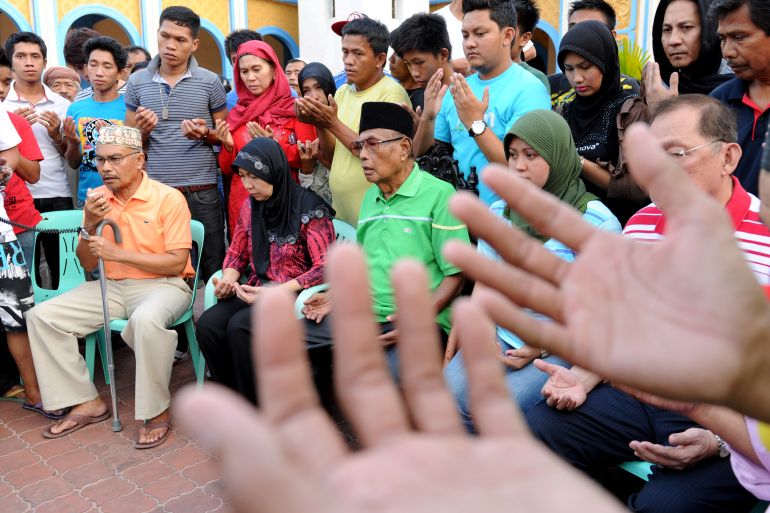Malaysia hails ‘victory’ in row with Sulu sultan’s Filipino heirs
Malaysian government says new ruling by French court could overturn a $14.9bn arbitration award handed to Filipino heirs of the 19th century Sulu sultanate.

A court in France has handed Malaysia a “decisive victory” in a long-running dispute with the alleged heirs of a 19th-century sultanate who are seeking to seize state assets around the world to enforce a $14.9bn arbitration award they won against the Southeast Asian nation, according to officials.
The Paris Court of Appeal’s judgement on Tuesday found that the arbitral tribunal that heard the petition filed by the Filipino heirs of the last sultan of Sulu – a region of northern Borneo in present-day Malaysia – did not have jurisdiction over the case, according to a statement by Malaysian Minister of Law Azalina Othman Said.
Keep reading
list of 4 itemsPetronas units in Luxembourg ordered seized in colonial-era row
Women linked to Abu Sayyaf suicide bombings arrested in Sulu
Sultanate of Sulu: Pawn or legacy?
The judgement implied that the Paris Court of Appeal will also annul the $14.9bn award handed down earlier, she said.
The sum was the second-largest arbitration award on record.
As part of efforts to enforce the award, the Filipino claimants had previously tried to seize three properties owned by the Malaysian government in Paris as well as assets of the Malaysian state oil firm Petronas in Luxembourg and the Netherlands.
Azalina described the latest ruling as “final and binding” and said it was “a decisive victory in Malaysia’s ongoing pursuit of legal remedies, which Malaysia is confident will result in comprehensive defeat for the claimants and their funders”.
The claimants said they would consider their options before the French Supreme Court.
Sultanate of Sulu
The dispute stems from an agreement signed in 1878 between Sulu Sultan Mohammed Jamalul Alam and two European colonists for the exploitation of resources in his territory, which then spanned rainforest-covered islands in present-day Philippines and the oil-rich Malaysian state of Sabah, on the northern tip of Borneo island.
Malaysia took over the arrangement after independence from the United Kingdom, paying an annual token sum of about $1,000 to the heirs, who are Philippine nationals. But it stopped the payments in 2013, after supporters of a man who claimed to be the sultan of Sulu launched a surprise incursion into Sabah.
Some 200 supporters of the late Jamalul Kiram III arrived on Sabah in boats from the Philippines, leading to armed standoff and fierce clashes that lasted nearly a month. Kiram, who claimed to be the “poorest sultan in the world”, was not one of the court-recognised heirs who received payments from Kuala Lumpur.
More than 50 people, including civilians, were killed in the incident, and Malaysia put some 30 Filipinos on trial on charges of “waging war” against the king.
At the time, the then-Malaysian Prime Minister Najib Razak said he had stopped the payments due to public anger over the incursion.
“I felt it was incumbent upon my duty and responsibility to protect the sovereignty of Sabah and the people of Sabah,” he told the Reuters news agency, adding he had not anticipated retaliatory legal action.
The heirs say they were not involved in the incursion and protested the suspension of payments.
Paul Cohen, a lead co-counsel for the late sultan’s heirs from the British law firm 4-5 Gray’s Inn Square, told Reuters he first heard of their claims from an oil and gas expert he cross-examined in 2014 in an unrelated case.
Knowing they did not have the financial means, Cohen in 2016 brought on board Therium, a UK firm that has bankrolled legal actions by raising money from institutional investors, including a sovereign wealth fund.
Therium conducted nine rounds of funding for the case, during which third-party investors repeatedly assessed its merits, according to 4-5 Gray’s Inn Square. The case has now cost more than $20m, including lawyers and researchers in eight jurisdictions, it said.
‘Sham arbitration’
The heirs notified their intention to begin arbitration in 2017 in Spain and initially sought $32.2bn in compensation.
Malaysia’s first response came in 2019 when the then-attorney general offered to resume the annual payments and pay 48,000 Malaysian ringgit ($10,400) in arrears and interest if the claim was dropped. The heirs rejected the offer and the case – which was overseen by Spanish arbiter Gonzalo Stampa – went on without Malaysia’s participation.
Malaysia successfully challenged the appointment of Stampa as the sole arbitrator in a Spanish court last year.
But Stampa argued in his award statement that the courts did not have jurisdiction over arbitration and moved the case to France to deliver the award – actions Malaysia says were unlawful.
On Tuesday, the Paris Court of Appeal ruled in the Malaysian government’s favour and ordered the Sulu heirs to pay Kuala Lumpur some 100,000 euros ($106, 904) in costs.
“The Paris Court of Appeal’s decision validates Malaysia’s long-held position that this sham arbitration is nothing more than an attempt by a group of individuals to extort an exorbitant amount of money from Malaysia,” said Robert G Volterra, a legal spokesperson for the Malaysian government.
“The Filipino citizens have sought to do this by inventing a sham arbitration, first in Spain and then in France, to hide what is a sovereignty claim over the resources of one of Malaysia’s states: Sabah,” he said in a statement. “The position is now clear: the courts of the country where Mr Stampa staged the sham arbitration rejected it as illegitimate and have instructed the Filipino citizens to pay EUR100,000 in costs to Malaysia.”
Stampa is also facing criminal prosecution in Spain for his actions in this case, according to media reports.
The Philippines has never completely dropped its claim to Sabah, whose people voted, once the British left, to join the newly independent Malaya in the Malaysian federation in 1963.
Hundreds of thousands of Filipinos have lived in Sabah for generations, many of them illegally.